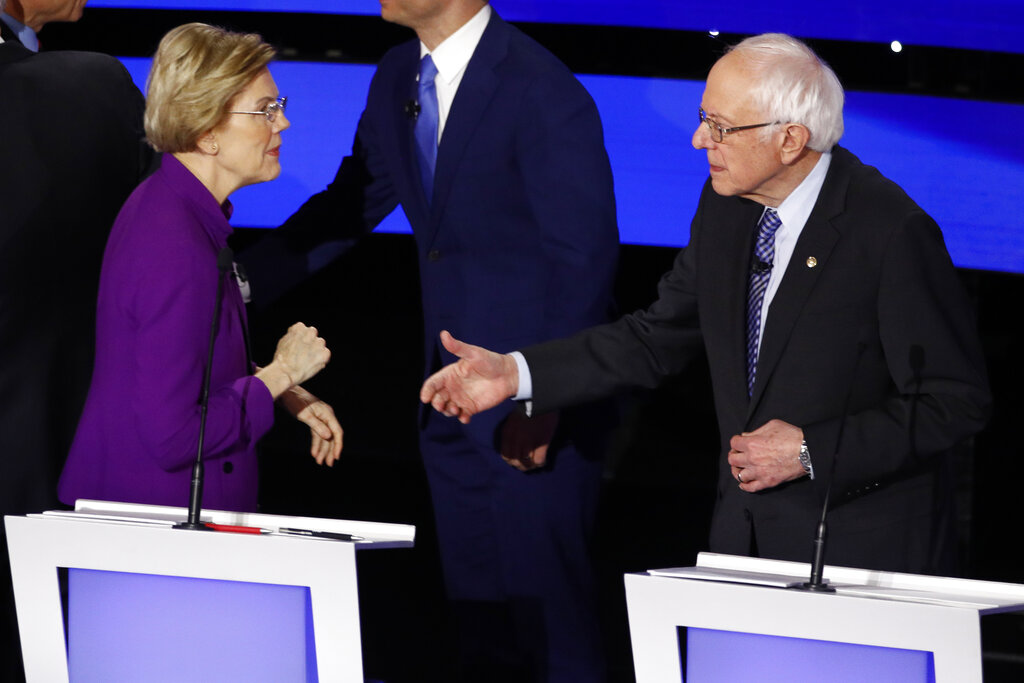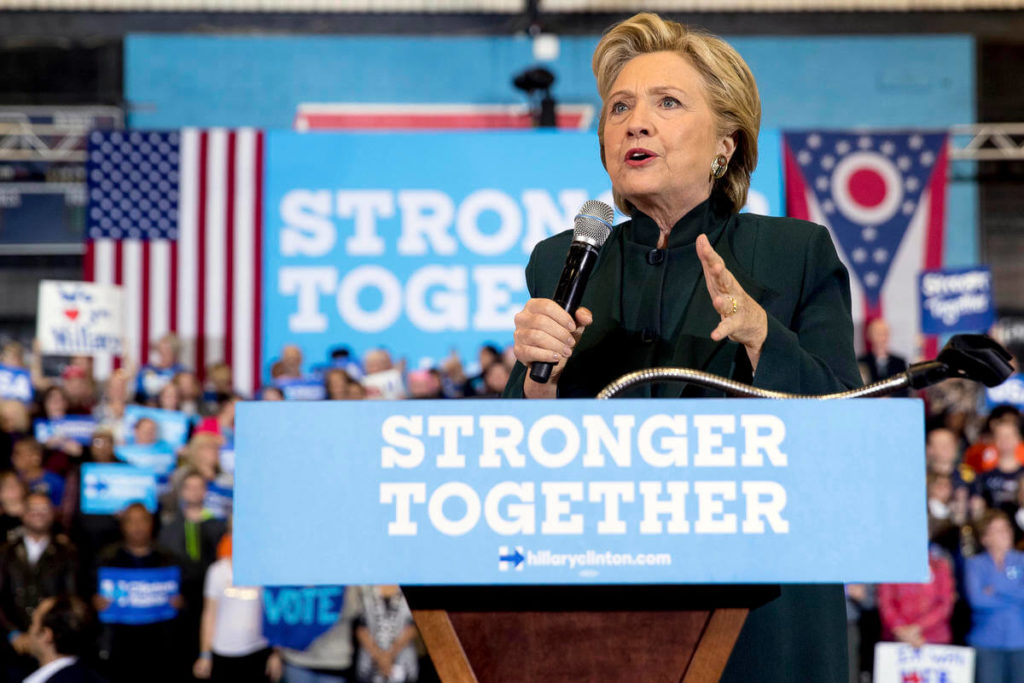Pete Buttigieg ends historic presidential campaign, urges unity

The announcement came a day after one of Buttigieg’s rivals, Joe Biden, scored a strong victory in South Carolina.
Elizabeth Warren-Bernie Sanders rift has progressives nervous about fallout

The rift stems from a private conversation in 2018.
For Hillary Clinton, struggle to change public perception persists

Hillary Clinton bested Donald Trump in three debates. She leads in many preference polls of the most competitive states. Barring a significant shift in the next two weeks, she is in a strong position to become the first woman elected U.S. president. But Clinton will end the campaign still struggling to change the minds of millions of voters who don’t think well of her, a glaring liability should the Democratic nominee move on to the White House. While many see her as better prepared to be commander in chief than Trump, she is consistently viewed unfavorably by more than half of the country. Most voters also consider her dishonest. Clinton’s advisers have spent months trying to erase that perception. They’ve set up small events where she had more intimate conversations with voters. They’ve tested a seemingly endless stream of messages aimed at assuring the public that the former secretary of state was in the race to do more than fulfill her own political ambitions. As Clinton starts making her closing argument to voters, her team appears to have come to terms that the mission remains unfulfilled. “Honest and trustworthy has become our most talked about metric because it’s not great,” said Jennifer Palmieri, Clinton’s communications director. “But we’ve never thought it’s the metric people make a decision on.” If Clinton wins, that theory may be proven true. Just 36 percent of voters believe Clinton is honest and trustworthy, according to a recent Washington Post/ABC News poll. That’s compared with about 60 percent who believe she has the qualifications and temperament to be commander in chief. The public’s perception of Clinton has bounced up and down throughout her time in public life. Her favorability rating fell below 50 percent at times during her years as first lady, but rose to its high water mark then and while she was as secretary of state under President Barack Obama. Democrats blame some of the current negative personal perceptions of Clinton on the hard-charging tactics she’s used to try to discredit Trump, though they believe her sustained assault on Trump’s character and temperament has been crucial. Party operatives also say Trump’s personal attacks on Clinton have made it all but impossible for more positive messages to break through. He’s called her a “liar,” a “nasty woman” and pledged to put her in jail. “When you’re under relentless assault from a reality TV star, it’s hard to come out of that with anybody feeling good about anyone,” said Bill Burton, a former Obama aide. Still, Clinton’s advisers acknowledge that some of her troubles have been of her own making, including her penchant for privacy. She’s spent nearly the entire campaign struggling to explain why she used a private email server in the basement of her home while she led the State Department. She hid a pneumonia diagnosis this fall from nearly all of her senior staff, then left the public unaware of her condition and whereabouts for 90 minutes after the illness caused her to rush out of a public event in New York. “She is a politician that does not seek to be the center of attention and is inherently more private than most politicians, certainly presidential candidates,” Palmieri said. “That doesn’t always serve you great in a campaign for president.” Clinton frequently shoots down questions about the public’s negative perceptions by saying she’s viewed more positively when she’s doing a job rather than running for one. There’s some evidence to back that up. When she ran for re-election to the Senate from New York in 2006, she won with 67 percent of the vote, a big jump from the 55 percent share from her first race in 2000. Her approval rating when she left the State Department, where her job kept her out of day-to-day politics, sat at an enviable 65 percent, according to the Pew Research Center. But if Clinton is elected president, she won’t have the luxury she had as secretary of state to stay away from the political fray — with Republicans in Washington in the opposition, and possibly Trump, too. The businessman keeps flirting with the idea he could contest the election results if he loses. There are also persistent rumors that, if he loses, he might try to harness the enthusiasm of his millions of supporters into some type of media venture. “The notion that Trump is going to go quietly into the night and wish her Godspeed is highly unlikely,” said David Axelrod, another former Obama adviser. “She’s going to have to contend with that and whatever it is he chooses to make his vehicle.” Clinton has begun acknowledging the challenge that could await her in the White House, if she wins, centering her closing argument to voters on a call for unity after a bitter campaign. “My name may be on the ballot, but the question really is who are we as a country, what are our values, what kind of a future do we want to create together,” she said Friday at a rally in Ohio. Some Democrats see the transition — the two-month-plus stretch between the Nov. 8 election and the Jan. 20 inauguration — as a crucial opportunity for her to signal, if she wins, that a Clinton White House would be different from a Clinton campaign. In a nod to bipartisanship, she could nominate a Republican for her Cabinet. Clinton could start moving on some of her more broadly popular policy proposals as a way of boosting her appeal, assuming no crisis demands immediate action. Still, Axelrod said changing the public’s view of Clinton will be a “long-term project.” “There’s no silver bullet to turn around years of wear and tear on her image,” he said. Republished with permission of the Associated Press.
Steven Kurlander: In defense of Debbie Wasserman Schultz

With the Democratic coronation of Hillary (and Bill again, too) Clinton slated to begin Monday, it looks like Congresswoman and Democratic National Committee Chairwoman Debbie Wasserman Schultz won’t be waiving her very curly hair, or the gavel as Chairwoman of the convention in Philadelphia. In fact, she resigned her position as Chairwoman before the convention began. David Axelrod, the former senior advisor to President Obama, stated Sunday “I would ask her to step aside. I would ask her to step aside because she’s a distraction in a week that is Hillary Clinton’s week.” CNN indicated that over the weekend the DNC decided not to allow DWS to speak or preside over the convention (the term “quarantined” was used) while Politico reported that DWS herself pulled herself off the convention dais for fear of being booed by Bernie Sanders supporters. The latest trouble for DWS as DNC Chairwoman began after the (obviously calculated) leak of over 20,000 email by WikiLeaks revealed that DWS and staffers at the DNC were working very hard against Bernie Sanders and his campaign. There was one particular email that set off its own shitstorm where it appeared to indicate that the DNC was going to play Sanders as an atheist to weaken his appeal to southern voters. Imagine that. DWS and the DNC working hard to ensure that self-described socialist Bernie would not get the nomination? Jeez, as Gomer Pyle would opine, SURPRISE, SURPRISE, SURPRISE! In reality, the American political system in terms of how we pick our leaders was always and continues to be just plain biased. There’s no fairness about it. Never was. Never will be. The expectation that political operatives like DWS and parties are arbiters of fairness is just plain silly. Her job, from the beginning of the campaign, was to ensure that Hillary (and Bill too) got nominated. Period. Whether you like her or not, both in her role as DNC Chairwoman or as the chief Democratic antagonist in the House (particularly after Congressman Anthony Weiner took one too many selfies), DWS has been the ultimate loyal soldier to the “mainstream” Clinton-Pelosi wing of the Democratic Party-whether it meant getting into contentious fights with Axelrod and the Obama White House or doing everything she could to ensure that Hillary (and Bill again too) sailed through a nomination process that was rigged from the get go. As chairwoman of a splintered and weak Democratic Party, DWS accomplished what Reince Priebus and mainstream Bushy Republicans couldn’t do – keep what would be in normal times a truly unqualified, populist candidate from obtaining the nomination for president. So while DWS was forced to resign by her own benefactors, DWS got the job done for Hillary (and Bill too). She may have in the long run also prevented the Democratic Party from becoming truly irrelevant to the majority of Americans too. No matter what David Axelrod or any other Democrats say, DWS should hold her curls and head high for a job well do


